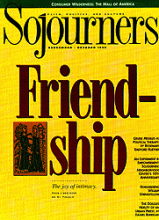Reckoning With Apocalypse is in the tradition of all good poetry and prose. It can be read on several different levels. On a very basic level, the work is a study guide to the New Testament book of Revelation. It is a commentary that requires the concentration and time of the reader, but a very worthwhile investment it is.
From another perspective, Reckoning With Apocalypse is an evangelical invitation to church folk to return to God. Author Dale Aukerman is a modern-day John the Baptist warning us to "Watch!" for the time is certainly approaching when God will fulfill the plan of redemption.
And yet again, the book flows from Aukerman's pen as a critique of both fundamentalist and liberal theologies. The fundamentalists are confronted with the hypocrisy of speaking the God-words and yet placing their faith in the bomb or the structures of traditional power. Liberals are faulted for vainly placing hope in humanity when, in reality, God is the one who has acted in history to move the universe toward a fulfilling consummation.
I was intrigued to read the book in one additional way, though there may be others. Near the end of the book, Aukerman becomes a teacher. It is as though he were sitting down with a young person to explain through logic and faith why the flow of history only has possibility in light of God's intervention.
The text mirrors the despair of our world, but the theme of the book is hope -- hope in the One who has offered us a way out of our dilemma. This perspective on hope is essential for those living and working together for peace and justice.
"DISCIPLES DO NOT LACK access to the central wielding of power. They can have the ear of the sovereign Lord," Aukerman argues. Only in light of the inbreaking order of God's reign is contemplation of involvement for justice and peace more than foolhardy posturing.
Read the Full Article

